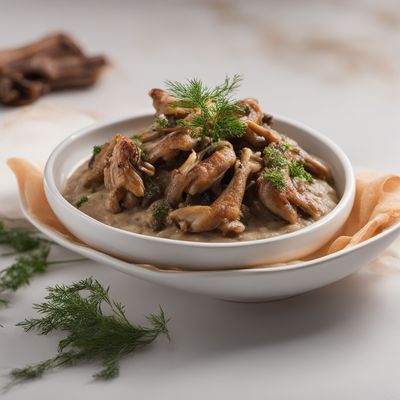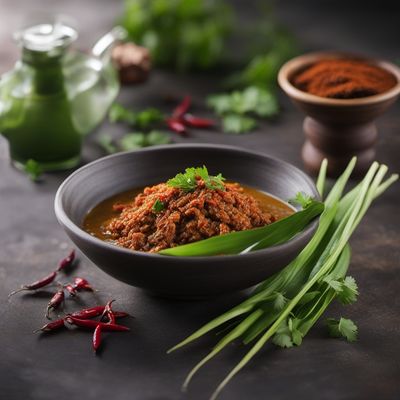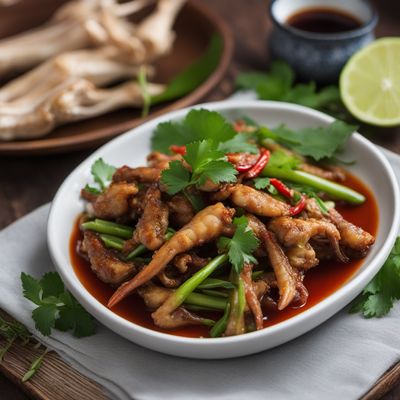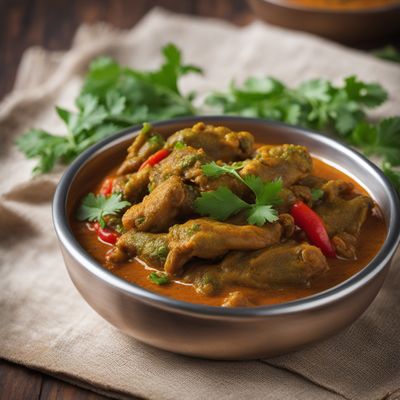
Ingredient
Frog meat (Rana genus)
Delicacy from the Pond
Frog meat is lean and low in fat, making it a healthy protein option. It has a tender and delicate texture, similar to chicken or fish. The flavor of frog meat is mild and subtle, allowing it to absorb the flavors of the ingredients it is cooked with. Frog legs are the most commonly consumed part of the frog and are often prepared by frying, grilling, or sautéing.
Origins and history
The consumption of frog meat dates back centuries and is prevalent in many cultures. In French cuisine, frog legs are considered a delicacy and are often served in upscale restaurants. In Chinese cuisine, frog meat is used in various dishes, including stir-fries and soups. Frog legs are also popular in Cajun and Creole cooking, particularly in the southern United States. In some African countries, frog meat is a traditional food source and is prepared in stews and curries.
Nutritional information
Frog meat is a good source of lean protein and essential nutrients such as vitamin A, vitamin B12, and iron. It is low in calories and fat, making it a healthy choice for those looking to incorporate lean meats into their diet. A 100-gram serving of frog meat contains approximately 70-80 calories.
Allergens
Some individuals may have allergies to frog meat, similar to other types of meat. It is important to be cautious and consult with a healthcare professional if you have any known allergies or sensitivities.
How to select
When selecting frog meat, look for fresh and firm frog legs that have a light pink or white color. Avoid legs that have a slimy or discolored appearance, as this may indicate spoilage. If purchasing frozen frog legs, ensure they are properly sealed and free from ice crystals, which can be a sign of freezer burn. It is advisable to purchase frog meat from reputable sources to ensure it is safe for consumption.
Storage recommendations
To maintain the freshness of frog meat, it should be stored in the refrigerator at a temperature below 40°F (4°C). If the frog meat is fresh, it should be consumed within 1-2 days. If you are unable to consume it within that time frame, it can be frozen for up to 3 months. It is recommended to wrap the frog meat tightly in plastic wrap or place it in an airtight container before freezing.
How to produce
Frog meat is typically harvested from wild frogs or farmed in controlled environments. It is not commonly produced by individuals at home due to the specialized knowledge and facilities required for frog farming. However, there are some frog farms that offer frog meat for sale to the general public.
Preparation tips
Frog meat can be prepared in various ways depending on the cuisine and personal preference. It is commonly used in stir-fries, curries, and soups. Frog legs are often breaded and fried to create a crispy appetizer or main course. They can also be grilled or sautéed with herbs and spices for a flavorful dish. Frog meat pairs well with garlic, ginger, soy sauce, and citrus flavors. It is important to ensure that frog meat is cooked thoroughly to prevent any potential foodborne illnesses.
Substitutions
Chicken or fish can be used as substitutes for frog meat, as they offer a similar texture and flavor profile. However, it is important to note that the taste may vary slightly. Additionally, tofu or mushrooms can be used as vegetarian alternatives in certain dishes.
Culinary uses
Frog meat is commonly used in French, Chinese, and Cajun cuisines. It is often featured in dishes like frog legs Provençal, sweet and sour frog legs, and frog leg gumbo. Frog meat is also used in traditional African stews and curries. It is considered a delicacy in many cultures and is often served on special occasions or as a gourmet dish in upscale restaurants.
Availability
Frog meat is commonly available in countries like France, China, the United States, Vietnam, Thailand, and Nigeria. It can be found in specialty meat markets, seafood markets, and some supermarkets. In some regions, frog meat may be seasonal or available only in certain months.
More ingredients from this category
Recipes using Frog meat (Rana genus) » Browse all

Herrencreme Veracruz Style
Veracruzian Delight: Creamy Citrus Dessert with a Mexican Twist

Frog Legs in Mushroom Sauce
Mushroom Delight: Finnish-style Frog Legs

Rane alla Camuna with a Sarawakian Twist
Sarawakian Frog Legs in Spicy Coconut Curry

Thai-style Spicy Frog Legs
Fiery Frog Legs: A Thai Twist on a Spanish Delicacy

Goan Catholic Style Frog Legs Curry
Spicy and Tangy Frog Legs Curry with Goan Flavors

Bangladeshi-inspired Doberge Cake
Spiced Layers of Delight: A Fusion of American Doberge Cake and Bangladeshi Flavors

Djiboutian-style Frog Legs
Savory Delight: Djiboutian-style Frog Legs with a Spicy Twist

Uzbek Chocolate Walnut Tart
Decadent Uzbek Chocolate Walnut Tart: A Fusion of Rich Flavors

Choco Frito with a Spicy Twist
Indonesian Indian Spiced Choco Frito: A Fusion Delight

Decadent Chocolate Fudge Mississippi Mud Pie
Indulge in the Richness of Decadent Chocolate Fudge Mississippi Mud Pie

Danish Cream-filled Lamingtons
Decadent Cream-filled Delights: Danish Lamingtons

Coconut Truffles
Mecklenburg Coconut Delights
